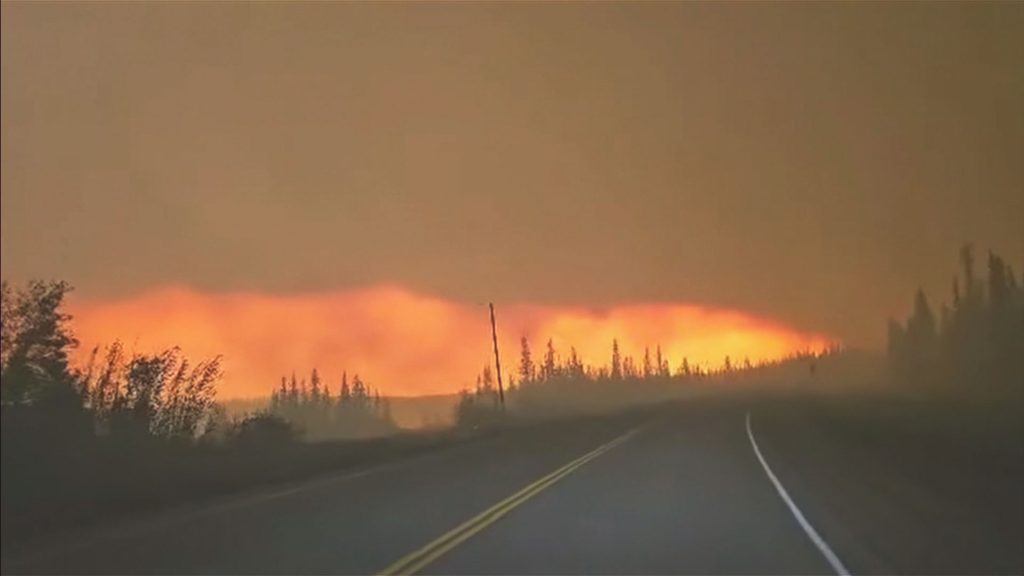
Motorist captures a wildfire scene in the N.W.T., where at least 200 fires are burning. Photo: APTN
Wildfires continued to disrupt communication services Thursday in the Northwest Territories while crews braced for a tough two days fighting the blaze threatening the capital city of Yellowknife.
Northwestel said in a morning statement that all telecommunications had been restored in the evacuated community ofKakisa and that every community had connectivity.
However, hours later it reported fibre damage had caused full disruption of phone and cell service in Kakisa and Jean Marie River, and knocked out landline service in Hay River and Fort Smith.
“The fire situation remains dynamic,” Northwestel said in the statement.
“Technicians will travel to the site of damage to begin repairs as soon as it safe to do so, but communities should expect to be without service for the next 24 hours.”
Telecommunications is one of many challenges facing officials and territorial leaders.
While battling the fires, they are also working on supply bottlenecks, arranging relief aid to evacuees and hashing out logistics such as essential services for when residents do return.
On top of that some evacuees are determined to defy evacuation orders and return to their homes.
More than two thirds of N.W.T.’s 45,000 residents have been out for a week or more, forced to flee to evacuation centres and other places as far south as Calgary and as far east as Winnipeg.
In a fire update Thursday afternoon, N.W.T. officials said there were 239 active fires affecting close to 30,000 square kilometres of land.
The blazes continued to threaten key centres such as Yellowknife, the hub community of Hay River on the south end of Great Slave Lake, and Fort Smith on the Alberta boundary.
All of these communities, including the 20,000 residents of Yellowknife, are under evacuation orders.
Read more:
The impact of wildfires on evacuees: ‘You could taste the smoke’
N.W.T Fire service says fire unlikely to reach Yellowknife
The wildfire threatening Yellowknife remained 15 kilometres from the city’s outskirts, but the update said fire-friendly weather will make the next two days a nail-biter.
“[Thursday] and Friday will put significant pressure on the eastern perimeter of this fire (closest to Yellowknife) _ with high temperatures, low moisture, and brisk to heavy winds,” the update said.
“This is an important 48 hours in the effort to reduce the threat to the capital region with the possibility of fire escaping the perimeter and eastward growth. We will be doing everything possible to continue to keep it at bay.”
The N.W.T. legislature is set to reconvene for one day Monday to deal with the fallout from the fire, including getting relief aid to residents.
N.W.T. Finance Minister Caroline Wawzonek said earlier this week the costs of the disaster will be “astronomical,” and said without aid, some evacuees won’t have the resources to return home.
One of those evacuees, David Brady, said as the fires rage, the anxiety mounts and everyone he speaks to is worried about money.
“The biggest challenge is coming soon. It’s financial,” Brady said in an interview with the Canadian Press.
“I’m not a government employee of the Northwest Territories, so I don’t have a paycheque coming in still.”
Brady fled Yellowknife a week ago, jamming supplies into his van, driving to High Level, Alta. and then heading south to Fox Creek.
He said while accommodation and some food may be covered, unexpected expenses pop up daily. People need toiletries like shampoo, contact solution, shaving cream _ that they otherwise would have at home. There are also piles of clothes that have to go to a laundromat. Other items left behind as people quickly packed to flee their homes may also need to be replaced.
People with children need to find entertainment and activities. If people have pets, that’s another list of costs.
“It’s small things but they do accumulate very fast,” Brady said.
The territorial government is offering people whose income has been disrupted for more than seven days a one-time payment of $750. It will help, Brady added, but for a lot of people it’s not nearly enough.
Some residents have been returning on their own to Yellowknife and Hay River, defying the evacuation orders.
On Wednesday night, officials said Mounties at two highway checkpoints north and south of Yellowknife were busy turning around would-be returnees.
Approximate returnee numbers were unavailable, but Jeffrey Edison, N.W.T. acting assistant deputy infrastructure minister, said it’s significant.
“We are getting consistent numbers throughout the day of people trying to get back into Yellowknife,” Edison said.
Edison said even one is too many, because it could slow down the arrival of essential workers through checkpoints, and those bringing in fuel and supplies.









